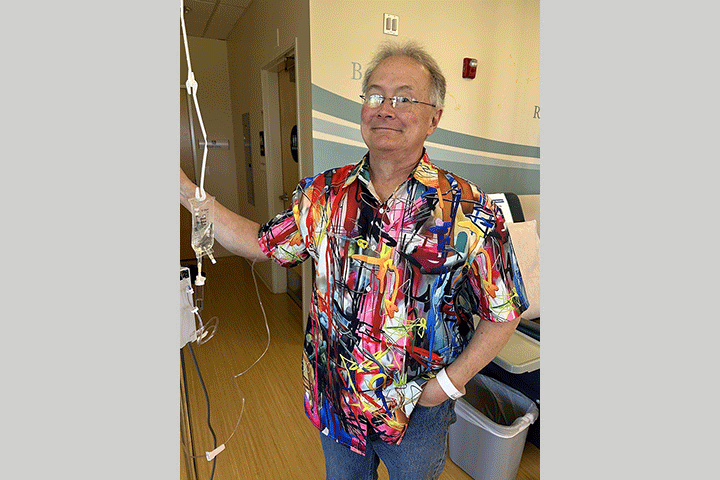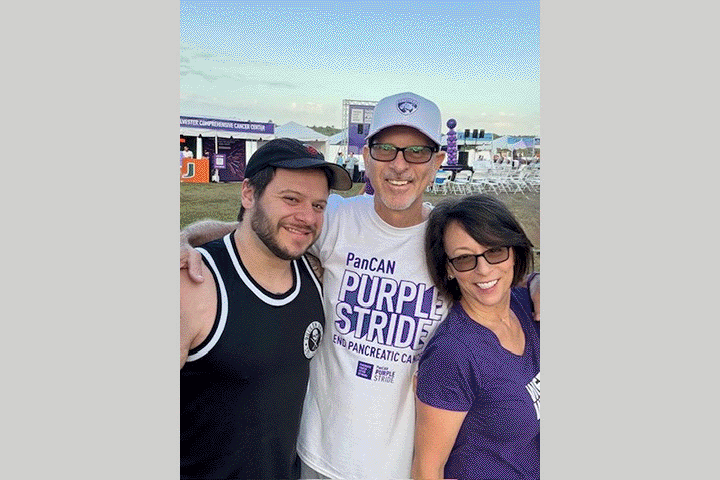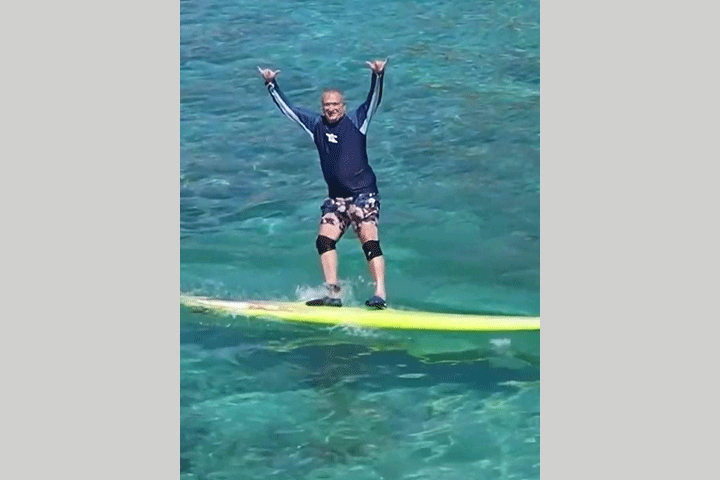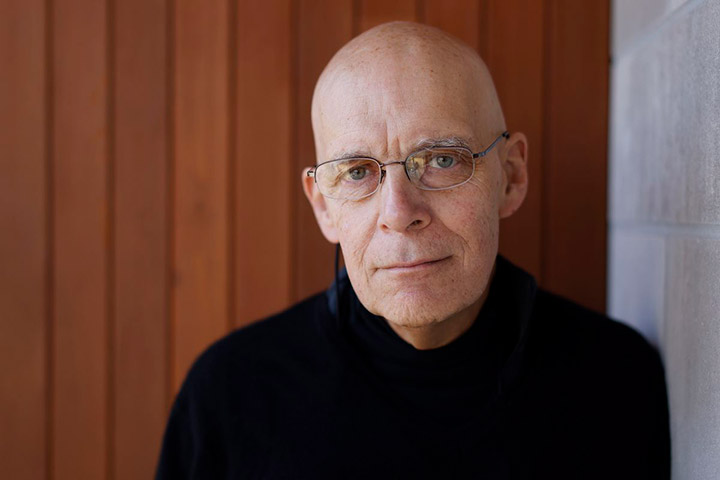I’m a Person, Not a Diagnosis

The most important part of my story is that I do not and will not ever consider myself a “cancer patient.” I refer to myself as “Burt who happens to have cancer.”
I also have chronic Lyme disease, eczema, ulcers, along with pancreatic neuroendocrine tumors and kidney cancer. Cancer is an inconvenience, and I am going to kick its ass. I don’t doubt that at all.
To give you some of my background, I am 57 years old, I live in Portland, Oregon, and I am married with two kids in their 20s and a small dog. My medical team is at Oregon Health & Science University (OHSU) in Portland, and I also see two naturopathic doctors, one in private practice and one at OHSU. I am a storyteller by nature and am very excited about everything Let’s Win is doing.
Here’s What Makes Me Interesting (at Least To Me)
Despite having cancer, I am very lightly symptomatic and can do most things without a problem. Even the chemo has caused minimal symptoms.
I’ve been trying to keep active (mind and body). I am learning a ton about myself, others, and the world around me. I follow and connect with others by being active on Facebook, LinkedIn, Twitter, and Instagram, and I started a blog, Adventures with NETs. As a marketing guy with a sense of humor, I understand what engages, entertains, and generates emotions in people. AND I want to get more involved in the community and help as many people as I can.
I also believe in integrative oncology and am trying to learn as much as I can about it.
Overall I am very lucky and very grateful. My wife is a truly amazing human being who doesn’t deserve to be a caregiver but is amazing at it and has saved me many times. I couldn’t be luckier. My kids are awesome. Both live in Southern California, are doing great, and are incredible supports for me. My friends provide a great net (excuse the pun) as well.
What I Have Learned
These are just some of the lessons that I’ve learned for myself. I really do see a lot of silver linings of having cancer, and it’s truly impacted my life in a lot of great ways, too. It’s important to note that we are all individuals and feel the way we do and learn what we do, so not everyone will agree with what I have to say.
- Don’t be a victim. I felt my worst when I didn’t understand what people were talking about. I felt like I was just doing what I was told. Things started getting better for me when I learned that I could say NO. Things got even better when I started reading, listening to podcasts, speaking to patients, and joining support groups.
- Real friends are so important, fake friends not so much. When I was diagnosed, after a month or so, I decided to let people know what I was going through. I used social media to do it. What I learned was incredible. Some people really, really cared and wanted to talk. Some cared and didn’t want to talk. And some that I would have expected to hear from I never did. The lesson? Invest in the friendships that are real and that go both ways. When you are really sick, it is not the time to make other people who don’t add value feel good. Take care of yourself first. It’s ok to write off those who cause you stress or were never really friends to begin with.
- There are people out there like you. And it’s worth the effort to find them. I’ve made some new friends since all of this began. Friends with the same cancers as me, friends with other cancers, and friends who have nothing to do with cancer but really care.
- No matter what life throws at you, don’t stop living. I have a bucket list for the first time. It was really fun to do it. I had all these ideas of things I want to do that came out when I started writing about it. Be outside more, taste more good foods, be with people you care about. No matter what your prognosis is, you can still enjoy your life.
- Prognosis isn’t an exact science. This is a tougher one. I really cared about my prognosis the first week or so after I was diagnosed and would ask about it all the time. In fact, I woke up a bunch of nights trying to figure out, if I was going, how I wanted to go, who I wanted there, where I wanted to be, etc. I am in SUCH a different place now. Now, if I need to get my act together quickly, tell me. Otherwise, I am not concerned about my prognosis because I believe I will beat this and be even better than I was.
- Everything should be holistic. I don’t believe in one modality of anything. I believe natural treatments have a place as do chemo and Western treatments. It all works together, and everything does something different. I am pretty sure that no one approach has “cured” cancer yet, so why not try everything, obviously making sure it won’t do harm?
- DO NOT PITY ME. People don’t know how to react when you tell them you have cancer. Statements like “I’m so sorry” or offers to form meal trains are example of things that come up. But I am feeling great. Just because that word (cancer) is now part of my description, don’t write me off. Under NO circumstances do I want people writing me off. I am not writing myself off, so why should others? And I don’t pity myself at all, so I don’t need pity from others. In fact, when someone asks “How are you?” I tell them that I will share but they have to promise not to say “I’m sorry.” The conversations I have when I get that promise are amazing! When you take the pity load off people, it frees them up to be real people and to look at you as a real person, not as a diagnosis.
- There are two parts to having cancer: treating it and experiencing it. DO NOT shortchange the experience piece—it’s critical. Life changes, for sure. Learning how to talk to people about it, if you can work, how to view yourself, who to talk to, questions to ask, etc., are all critical to your care. The mental is as important as the physical.
- What goes up is ok to go down. I used to hate being in a bad mood, feeling bad, or being sad. I would try to “fix” myself and get out of it by distraction or other methods. Guess what? Now I allow myself to be sad, to be down, to not feel my best. It’s ok, I am going through a lot, and feeling something other than happiness is fine. Give yourself the space and permission to feel how you feel.
- Give yourself some guiding principles. I am Jewish but not religious. For Yom Kippur (the Day of Atonement) this year, I took a long hike in the woods near my house. I spent time thinking about what is important to me and what I want to accomplish. I came up with three guiding principles for myself that have helped me prioritize my time and volunteer efforts and how I am living my life:
- I want to heal myself.
- I want to help others heal.
- I want to help others who help others heal.
Those three guidelines have helped me a ton. I have even resigned from things that I don’t feel fit into them.
I am always happy to talk to people and help anyone. Feel free to reach out on my blog or through Facebook, LinkedIn, Twitter, or Instagram.
Burt Rosen shared how he was diagnosed with PNET and how his treatment is progressing in “Learning All I Can About PNET.” But a big part of his story is how he manages his treatment.






